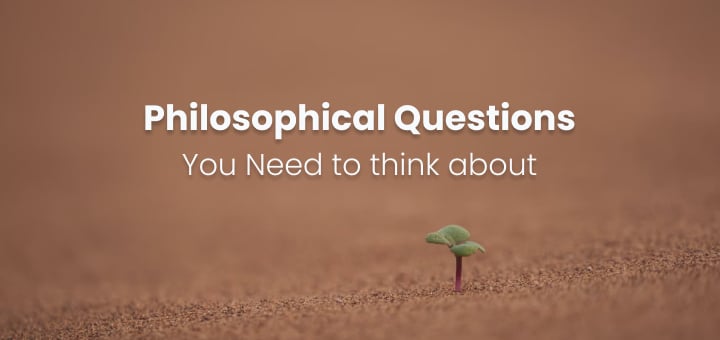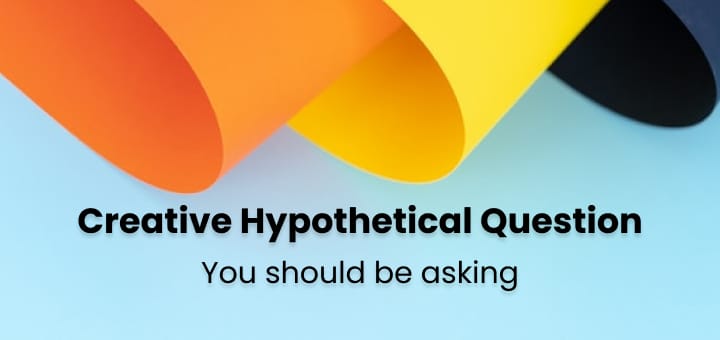Even though we’re living in the 21st century, there are still some really interesting philosophical questions that come up.
Philosophers have been debating these types of issues for over 2000 years and it doesn’t look like they’re going to stop any time soon.
This list is just a small sample of the many questions that will keep you on your toes, but hopefully get you thinking about what life means to you!
Is life inherently meaningless without knowledge of what comes next? Philosophical questions like these are important because they make us think about our values and beliefs in a deeper way.
50 Philosophical Questions to Ask ourselves
What happens when we die?
Where did the universe come from?
Are there truly deeper reasons for our decisions? Or is everything just a matter of chance and coincidence?
Can anyone have absolute truth, or are all truths relative to what each individual believes in their own heart.
Does reality exist outside of our own personal perception of it?
Is there really such a thing as good and evil, or are both merely subjective judgments made by people who prefer one over the other?
Are all ideas valid to some degree? Or only those that agree with someone’s existing beliefs; how else could they be drawn into an argument if their idea wasn’t already valid to them?
What harsh truths do you prefer to ignore?
Is free will real or just an illusion?
Is there a meaning to life? If so, what is it?
Where is the line between art and not art?
What should be the goal of humanity?
Does fate exist? If so, do we have free will?
What does it mean to live a good life?
Why do we dream?
Where does your self-worth come from?
Is it possible to have no regrets in life?
Do good intentions justify bad actions?
How should we define evil, if at all? Is there such a thing as human nature or are we just the product of our environment and experiences. If so, can people really be held accountable for their own decisions and do they truly create themselves through their choices?
Is the truth worth pursuing, or is ignorance bliss?
If we live in a simulation, who created it and why does its creator want to play God with our lives (or simply observe them)?
When you die are your memories carried on through another form somewhere else?
Is there an afterlife of any kind; if so where did it come from?
Is there a difference between believing in something and knowing it to be true, or are both forms of faith equally valid (or invalid)?
Is the universe infinite or is it bounded by an edge somewhere; if so what’s on the other side?
What do we define as human nature, and where did this idea originate?
Is it better to be an atheist or a theist; and what’s the difference between them anyway?
Is there such thing as human nature, if so how does it affect our morality?
Do we need religion in order to have ethics that promote good behaviour toward one another (or is this just an excuse for religious leaders to control their followers)?
Is there such thing as absolute truth? If so, what is it and how do we know about it (without simply creating one for ourselves based on our own personal preference or preconceived notions)?
Does morality exist objectively, or are all moralities merely social constructs that vary between cultures? Who really gets to decide which ones are right; you or someone else who thinks they’re better than everyone else because of the religion they chose to follow.
Is evil just another name for ignorance? Or does it truly exist as a force in its own right capable of influencing people without them even realizing it?
There was existence before the big bang occurred? What caused that initial explosion into being where exists now? Why has nothing ever truly been destroyed, only changed form?
Is it possible for something to be simultaneously both good and evil at the same time (or neither)?
How long will you be remembered after you die?
If a child somehow survived and grew up in the wilderness without any human contact, how “human” would they be without the influence of society and culture?
How would humanity change if all humans’ life expectancy was significantly increased (let’s say to around 500 years)?
Where do you find meaning in your life?
What is the most important thing in life? Is it happiness, love, family or something else entirely?
Why are you here? What’s your purpose for being alive on Earth among all of humanity with its short-lived existence and countless struggles just to survive today?
How do we define good when acts of evil seem so much more powerful and prevalent in the world than acts of good?
Is it possible to be happy without love or family around you, or is that just a lie we tell ourselves so our suffering doesn’t seem as bad?
Does free will exist; if so how can we know for sure when everything appears to happen according to such well-defined and specific laws of nature. Is it possible for something to be simultaneously both good and evil at the same time (or neither)?
If the truth is worth pursuing, why does ignorance seem more attractive even though we know that nothing lasts forever?
Why do people still behave as though they can get away with anything and everything, even when it clearly contradicts the lessons we learned from history.
Is humanity doomed to repeat our mistakes until finally one day someone realizes that religion is nothing but a tool for controlling the masses; or will something more altruistic eventually take its place?
Does morality exist objectively, or are all moralities merely social constructs that vary between cultures?
Who really gets to decide which ones are right; you or someone else who thinks they’re better than everyone else because of the religion they chose to follow?
If we’re all just random accidents that popped into existence by chance and then evolved over time into intelligent life forms, then why do we feel like there has to be some greater meaning behind it all? Or is that just wishful thinking on our part?
What makes life worth living; happiness, love or something else entirely? If you lost everything tomorrow would it matter in the long-term?
What is the purpose of our existence in the grand scheme of things; if anything does it have a greater meaning or are we all just a result of the same random events that occur every day?
What makes you happy; is it family, love or something else entirely?
What makes a human being truly unique, their mind or the ability to reason?
How can we be certain of anything when it’s impossible to truly know a person or thing even if they appear perfectly happy and content?



